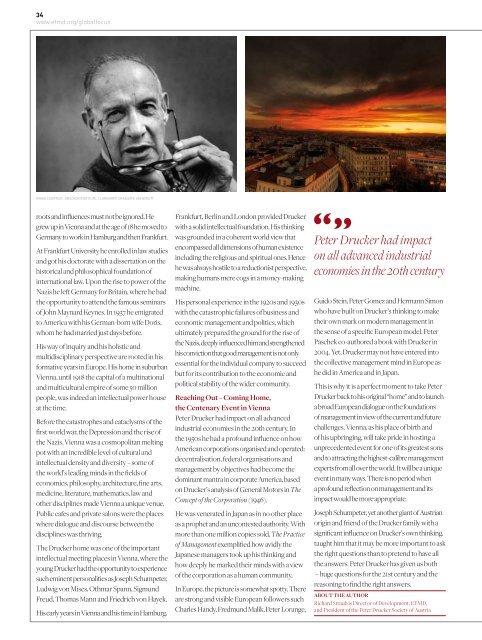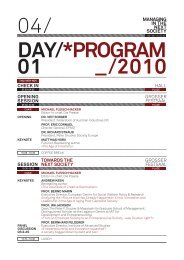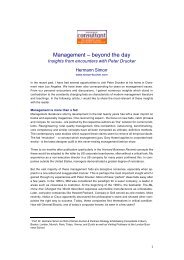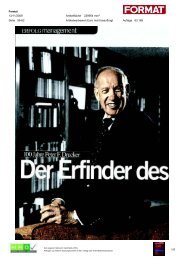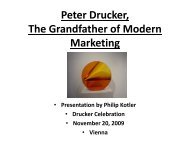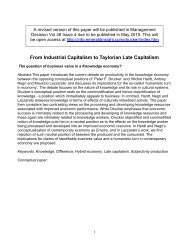Download PDF-Version (469 k) - Peter Drucker Society of Austria
Download PDF-Version (469 k) - Peter Drucker Society of Austria
Download PDF-Version (469 k) - Peter Drucker Society of Austria
Create successful ePaper yourself
Turn your PDF publications into a flip-book with our unique Google optimized e-Paper software.
34<br />
www.efmd.org/globalfocus<br />
IMAGE COURTESY: DRUCKER INSTITUTE, CLAREMONT GRADUATE UNIVERSITY<br />
roots and influences must not be ignored. He<br />
grew up in Vienna and at the age <strong>of</strong> 18 he moved to<br />
Germany to work in Hamburg and then Frankfurt.<br />
At Frankfurt University he enrolled in law studies<br />
and got his doctorate with a dissertation on the<br />
historical and philosophical foundation <strong>of</strong><br />
international law. Upon the rise to power <strong>of</strong> the<br />
Nazis he left Germany for Britain, where he had<br />
the opportunity to attend the famous seminars<br />
<strong>of</strong> John Maynard Keynes. In 1937 he emigrated<br />
to America with his German-born wife Doris,<br />
whom he had married just days before.<br />
His way <strong>of</strong> inquiry and his holistic and<br />
multidisciplinary perspective are rooted in his<br />
formative years in Europe. His home in suburban<br />
Vienna, until 1918 the capital <strong>of</strong> a multinational<br />
and multicultural empire <strong>of</strong> some 50 million<br />
people, was indeed an intellectual power house<br />
at the time.<br />
Before the catastrophes and cataclysms <strong>of</strong> the<br />
first world war, the Depression and the rise <strong>of</strong><br />
the Nazis, Vienna was a cosmopolitan melting<br />
pot with an incredible level <strong>of</strong> cultural and<br />
intellectual density and diversity – some <strong>of</strong><br />
the world’s leading minds in the fields <strong>of</strong><br />
economics, philosophy, architecture, fine arts,<br />
medicine, literature, mathematics, law and<br />
other disciplines made Vienna a unique venue.<br />
Public cafes and private salons were the places<br />
where dialogue and discourse between the<br />
disciplines was thriving.<br />
The <strong>Drucker</strong> home was one <strong>of</strong> the important<br />
intellectual meeting places in Vienna, where the<br />
young <strong>Drucker</strong> had the opportunity to experience<br />
such eminent personalities as Joseph Schumpeter,<br />
Ludwig von Mises, Othmar Spann, Sigmund<br />
Freud, Thomas Mann and Friedrich von Hayek.<br />
His early years in Vienna and his time in Hamburg,<br />
Frankfurt, Berlin and London provided <strong>Drucker</strong><br />
with a solid intellectual foundation. His thinking<br />
was grounded in a coherent world view that<br />
encompassed all dimensions <strong>of</strong> human existence<br />
including the religious and spiritual ones. Hence<br />
he was always hostile to a reductionist perspective,<br />
making humans mere cogs in a money-making<br />
machine.<br />
His personal experience in the 1920s and 1930s<br />
with the catastrophic failures <strong>of</strong> business and<br />
economic management and politics, which<br />
ultimately prepared the ground for the rise <strong>of</strong><br />
the Nazis, deeply influenced him and strengthened<br />
his conviction that good management is not only<br />
essential for the individual company to succeed<br />
but for its contribution to the economic and<br />
political stability <strong>of</strong> the wider community.<br />
Reaching Out – Coming Home,<br />
the Centenary Event in Vienna<br />
<strong>Peter</strong> <strong>Drucker</strong> had impact on all advanced<br />
industrial economies in the 20th century. In<br />
the 1950s he had a pr<strong>of</strong>ound influence on how<br />
American corporations organised and operated:<br />
decentralisation, federal organisations and<br />
management by objectives had become the<br />
dominant mantra in corporate America, based<br />
on <strong>Drucker</strong>’s analysis <strong>of</strong> General Motors in The<br />
Concept <strong>of</strong> the Corporation (1946).<br />
He was venerated in Japan as in no other place<br />
as a prophet and an uncontested authority. With<br />
more than one million copies sold, The Practice<br />
<strong>of</strong> Management exemplified how avidly the<br />
Japanese managers took up his thinking and<br />
how deeply he marked their minds with a view<br />
<strong>of</strong> the corporation as a human community.<br />
In Europe, the picture is somewhat spotty. There<br />
are strong and visible European followers such<br />
Charles Handy, Fredmund Malik, <strong>Peter</strong> Lorange,<br />
<strong>Peter</strong> <strong>Drucker</strong> had impact<br />
on all advanced industrial<br />
economies in the 20th century<br />
Guido Stein, <strong>Peter</strong> Gomez and Hermann Simon<br />
who have built on <strong>Drucker</strong>’s thinking to make<br />
their own mark on modern management in<br />
the sense <strong>of</strong> a specific European model. <strong>Peter</strong><br />
Paschek co-authored a book with <strong>Drucker</strong> in<br />
2004. Yet, <strong>Drucker</strong> may not have entered into<br />
the collective management mind in Europe as<br />
he did in America and in Japan.<br />
This is why it is a perfect moment to take <strong>Peter</strong><br />
<strong>Drucker</strong> back to his original “home” and to launch<br />
a broad European dialogue on the foundations<br />
<strong>of</strong> management in view <strong>of</strong> the current and future<br />
challenges. Vienna, as his place <strong>of</strong> birth and<br />
<strong>of</strong> his upbringing, will take pride in hosting a<br />
unprecedented event for one <strong>of</strong> its greatest sons<br />
and to attracting the highest-calibre management<br />
experts from all over the world. It will be a unique<br />
event in many ways. There is no period when<br />
a pr<strong>of</strong>ound reflection on management and its<br />
impact would be more appropriate.<br />
Joseph Schumpeter, yet another giant <strong>of</strong> <strong>Austria</strong>n<br />
origin and friend <strong>of</strong> the <strong>Drucker</strong> family with a<br />
significant influence on <strong>Drucker</strong>’s own thinking,<br />
taught him that it may be more important to ask<br />
the right questions than to pretend to have all<br />
the answers. <strong>Peter</strong> <strong>Drucker</strong> has given us both<br />
– huge questions for the 21st century and the<br />
reasoning to find the right answers.<br />
ABOUT THE AUTHOR<br />
Richard Straub is Director <strong>of</strong> Development, EFMD,<br />
and President <strong>of</strong> the <strong>Peter</strong> <strong>Drucker</strong> <strong>Society</strong> <strong>of</strong> <strong>Austria</strong>


